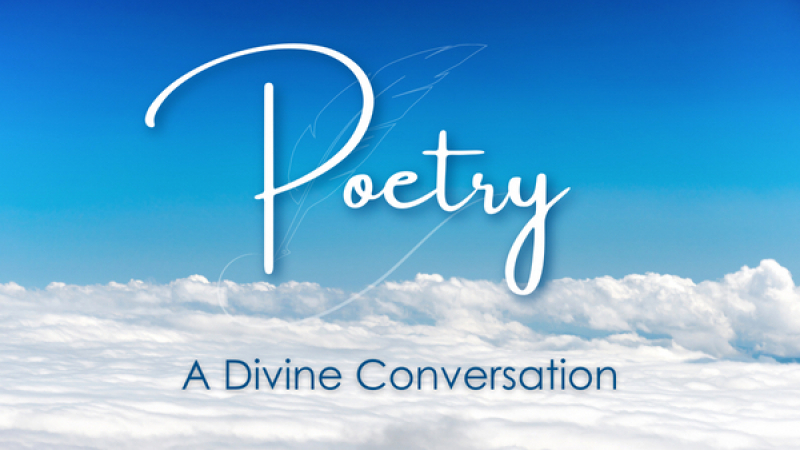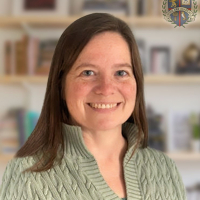Poetry: A Divine Conversation

Poetry: A Divine Conversation
“Not by art does the poet sing, but by power divine” (Plato, Ion 534c).
Historically in Classical education, scholars studied the Seven Liberal Arts. During the
Middle Ages, the Liberal Arts were crowned with Philosophy. Renaissance Humanists added
History. Since then the disciplines of the Liberal Arts have continued to multiply. With such a
diverse multitude of subjects competing for a limited amount of time, why should students study
Poetry? The mythology of the Norse, the philosophy of the Greeks and the history of the English
reveal the belief that poets are inspired by God. Poetry should be studied because it is a divine
conversation.
In Norse mythology, poetry came to earth as a gift from the god Odin. Gnomes brewed a
magical mead from herbs, honey and the essence of knowledge. Whoever drank this powerful
elixir could speak with the sweet tongue of a poet. Odin stole the mead from its underground
hiding place by drinking it and flying back to Asgard in the form of an eagle. Chased by an
enemy and weighed down by the mead, Odin spewed a shower of honey-rain on the Aesir who
collected the brew in buckets. Spilling from Odin’s mouth some drops fell to the earth, but once
there the potion lost its power and the men who drank it spoke only doggerel. In Asgard, Odin
guarded the magical mead giving it on earth only to the chosen – the poets. Poetry, according to
Norse mythology, is a gift from god to humanity.
The Greek philosophers, Socrates and Plato, teach that “beautiful poems are not
human, or the work of man, but divine and the work of God'' (Plato, Ion 534e). Plato writes a
dialogue Socrates has with the first-place winning rhapsode, Ion, a professional reciter of poetry.
Socrates questions Ion about his art while arguing that a rhapsode speaks through inspiration.
“There is a divinity moving in you,” Socrates explains (Plato, Ion 533d). Like metal links held
together by the invisible force in a magnetic chain, a rhapsode is inspired through a poet who is
inspired by the Muse. “For all good poets, epic as well as lyric, compose their beautiful poems
not by art, but because they are inspired” (Plato, Ion 533e). The poets, Socrates says, are not
speaking of themselves, but “God himself is the speaker, and that through them [the poets] he is
conversing with us” (Plato, Ion 534d). According to Socrates, poetry is a conversation with God.
While these two examples from Classical history may be familiar, the story of the
miraculous beginning of English Devotional poetry is not as well known. In the ecclesiastical
history of the Anglo-Saxons, poetry is the result of a divine intervention. Bede tells the story of
Cædmon. Just a simple man cleaning cow stalls one night to avoid singing poetry in the pub
with his friends, he sees a vision. A man commands Cædmon, “Sing me something!” Cædmon
responds that he cannot, after all, this is why he is hiding in the barn with the cows. Refusing to
be dismissed by Cædmon’s excuses, the mystical messenger declares an impossibility as
accepted fact, “Nevertheless, you will sing” (Bede, HE IV.xxiv). Miraculously Cædmon sings the
first poem in the Anglo-Saxon style about the Christian God, “Now we must praise the Guardian
of the kingdom of heaven” (Cædmon 1). In the morning, Cædmon sings for the abbess and
other scholars of the abbey. They recognize Cædmon’s song as the work of God. Cædmon lives
the remainder of his life at the abbey composing poetry on Biblical subjects. Recorded In the
margins of the Latin text, Cædmon’s song is written in Old English – the first Christian poem
written in the English language. Poetry is a miracle.
Combining these three ancient stories about the conception of poetry reveals a timeless
truth. Poetry is a miraculous gift from God – a conversation with Him. Amidst all the choices for
modern students, the purpose for studying poetry is founded on an ancient truth – studying
poetry is a study in prayer. In the first line of his gospel account, the apostle John uses a poetic
device, metaphor, to explain the first ancient Truth, “In the beginning was the Word.” Scripture is
the arms of God reaching out to humanity; poetry is the arms of humanity reaching out to God.
“For the poet is a light and winged and holy thing” (Plato, Ion 534b).







